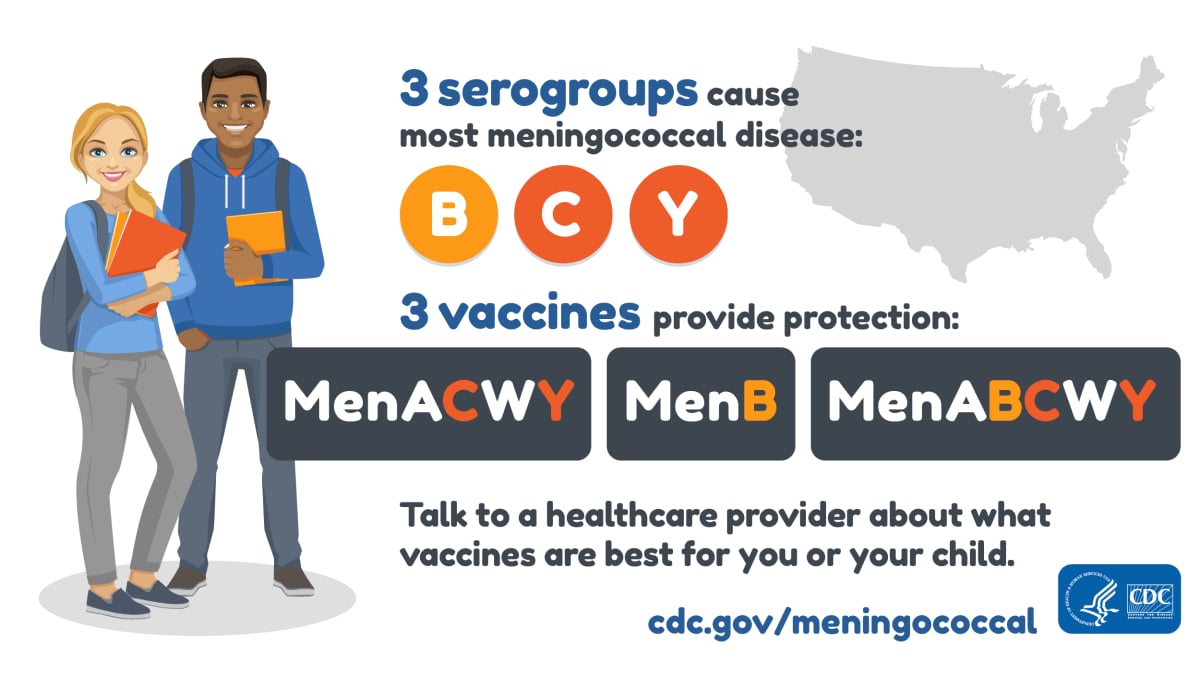Key points
- CDC recommends meningococcal vaccination for all preteens and teens.
- Talk to a healthcare or vaccine provider about meningococcal vaccination to help protect your child's health.

Vaccines your teen may need

There are 3 types of meningococcal vaccines used in the United States. Each type helps protect against different serogroups (strains) of meningococcal bacteria.
- Meningococcal conjugate or MenACWY vaccines
- Protect against serogroups A, C, W, and Y
- Protect against serogroups A, C, W, and Y
- Serogroup B meningococcal or MenB vaccines
- Protect against serogroup B
- Protect against serogroup B
- Pentavalent or MenABCWY vaccine
- Protects against serogroups A, B, C, W, and Y
- Protects against serogroups A, B, C, W, and Y
Recommendations by vaccine type
MenACWY vaccines
All preteens (11 to 12 year olds) should get a MenACWY vaccine. Since protection decreases over time, CDC recommends a booster shot at 16 years old. The booster shot provides protection during the ages when teens are at highest risk of meningococcal disease.
Many colleges require proof of MenACWY vaccination within 5 years before starting school. Regardless of school requirements, CDC recommends a booster for all teens who received the first shot before their 16th birthday. Teens who receive their first MenACWY shot at or after age 16 years don't need a booster.
MenB vaccines
Teens may get a MenB vaccine, preferably at 16 through 18 years old.
While any teen may choose to get a MenB vaccine, certain preteens and teens should get it. CDC recommends MenB vaccines for preteens and teens with the following risk factors:
- A complement component deficiency
- Functional or anatomic asplenia
- An inhibited complement system due to receiving certain medicines
- Part of a population at increased risk during an outbreakA
MenABCWY vaccine as an option
MenB considerations
Serogroup B meningococcal disease is relatively rare. Outbreaks have occurred at several U.S. colleges during the past decade. CDC's current recommendation gives people access to MenB vaccines to help prevent this uncommon, but serious illness.
However, healthcare providers and parents should discuss the risk of the disease and weigh the risks and benefits of vaccination. Available data suggest these vaccines safely provide protection, but that protection decreases fairly quickly after vaccination.
Learn more about how well meningococcal vaccines work.
Brand considerations
CDC has no preference as to which brand of meningococcal vaccine anyone receives.
However, it's important to note that both MenB vaccine brands require multiple shots for maximum protection. People must get the same MenB vaccine brand for all shots. MenABCWY vaccine includes the MenB vaccine Trumenba®. If someone receives MenABCWY vaccine, then they need to get Trumenba® for their second MenB shot.
Safety and side effects
Meningococcal vaccines safely provide protection. Like with medicines, there is a chance of side effects with vaccines. Learn more about the possible side effects of meningococcal vaccines.
Teens are more likely to have side effects after MenB vaccination compared to other vaccines given to preteens and teens. Those other vaccines include HPV, MenACWY, and Tdap vaccines.
CDC continually monitors the safety of all vaccines. For more information, view the vaccine information statements:
- MenACWY: English | Other languages
- MenB: English | Other languages
Resources
Fact sheet: Meningococcal vaccines for preteens and teens
English | Spanish
Meningococcal disease and people receiving complement inhibitors
- Specifically, an outbreak involving serogroup B
